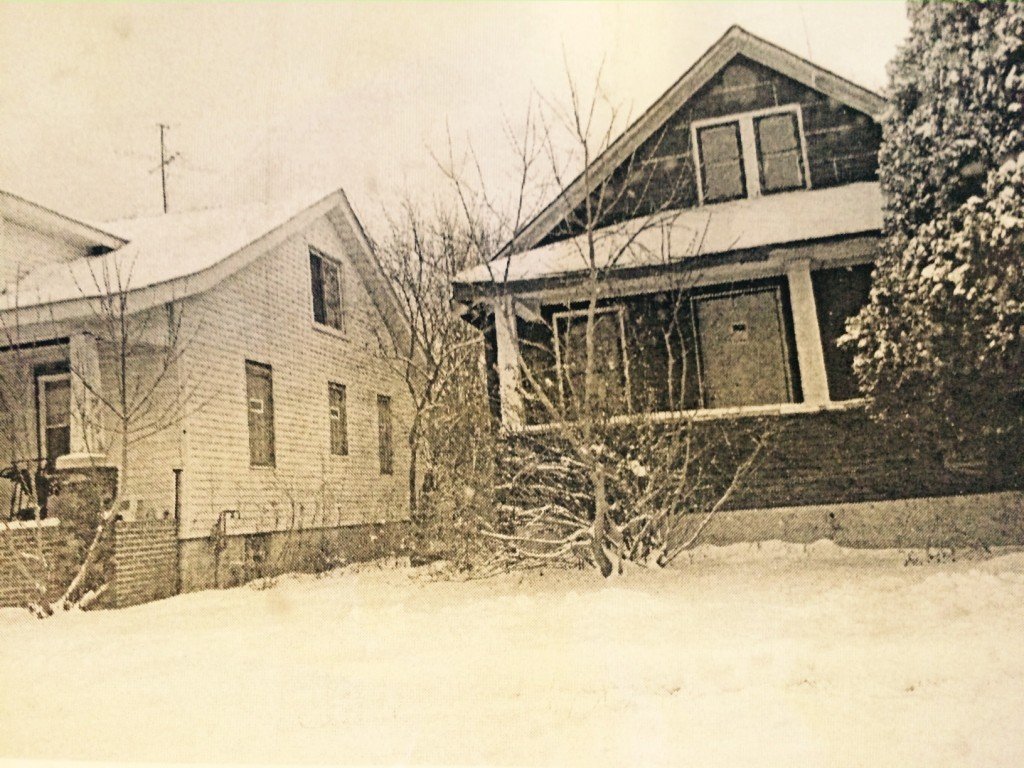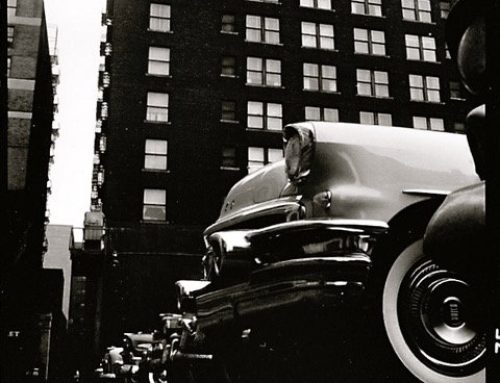By Amanda Lewan
Last year, when driving back from Detroit to his home in Fraser, my dad took a detour. Dad is by nature an anxious man, but that anxiety spiked when he turned down an ice-and-snow-covered street. It was the street he had grown up on, Linnhurst, on the east side of Detroit. It was daytime still but Dad was cautious, driving slowly with his eye out for others.
There was not much around us. A few empty lots were lined in a row covered with bushes, grass, and scraggly trees, crooked trees climbing out of the frozen ground. There were a few homes, more empty spaces, and then Dad came to a complete stop.
 He was filled with nostalgia, naming the neighbors, pointing out each spot they had once called home. It was a declaration that this place was once alive. We were sitting across from a ghost of a house. It was still standing, though boarded up and in desperate need of repair. Nothing about it was remarkable, but it was still recognizable to Dad.
He was filled with nostalgia, naming the neighbors, pointing out each spot they had once called home. It was a declaration that this place was once alive. We were sitting across from a ghost of a house. It was still standing, though boarded up and in desperate need of repair. Nothing about it was remarkable, but it was still recognizable to Dad.
“I can’t believe it’s still standing,” he said to my sister and me, who were watching him as much as we were watching the still street. He took a photo to send to his brothers and sisters, to show his own father. The family was spread out across the suburbs now, with families of their own. We were stopped in the street for five minutes, and I began to worry. Dad was in shock at a past so easily changed. A past that can be so easily removed, left behind.
There was not much around us; there was so much missing.
My friends and I have spoken about the desensitization to blight you acquire when you live or work in Detroit. You see it all around you, even near downtown, and you just get used to it. You don’t have the awe of visitors and their “ruin porn,” the way they gawk at large and abandoned buildings for the shock value. For as long as I can remember, my grandma’s house was almost alone on its block facing a burned-out home. As a kid, I never understood why it still remained charred and filled with blackened toys. I remember wanting to grab the stroller that had fallen to the side, its blacked arms reaching out from the ground. Then I just got used to always seeing it there.
There was not much around us; there was so much missing.
[blocktext align=”right”]There was not much around us; there was so much missing.[/blocktext]In Detroit today there has been effort to count all of the blighted properties, to count every single burned-out home still standing. The task was a mighty one. Called the Motor City Mapping project, it was helmed by a local tech startup and assisted by residents and community groups, and it recorded more than 375,000 properties across the city of Detroit. Of those lots, the project counted an estimated 29,470 homes that need to be boarded up and almost 50,000 structures unoccupied. The data is available for all residents to see, offering transparency to blight around them.
The numbers are almost too large to grasp in the aggregate, but their impact can be felt on a personal level. My father and his family aren’t the only ones who feel they’ve lost a piece of their family history. I hear stories all the time of neighborhoods changing, about childhood homes now gone. With the city so large and suffering from decades of population loss and urban sprawl, it would surprise me to find any place that hasn’t changed drastically. I’m sure many other Rust Belt cities face the same issues as Detroit, but the size of the problem is unfathomable here.
There was not much around us; there was so much missing.
Dad’s family moved out of that home when he was a teenager, to a house a bit farther out on Hayes. Later, Dad moved to the suburbs. He got an apartment with my mom when they were married, then moved to Fraser, to the home we grew up in. That is where he remains today.
Dad fought the disease of blight for more than twenty years. He ran his own construction business, boarding up homes for the government. He repaired, boarded up, and helped make the houses safe with the hopes they would be restored someday. Then he gave up. He couldn’t fight it anymore. Business had slowed down for his small company, and the work was getting too dangerous. “There was no use,” he later told me. “Every house I boarded up will just get broken into.”
 When he closed down his business, he struggled to find work. So much of his life had been committed to the hard, heavy work of construction. He resigned himself to cooking and caring for us until my sister and I were in elementary school. Then, he went out to clean up other messes, working for public schools as a janitor. He never went back to running his own business again.
When he closed down his business, he struggled to find work. So much of his life had been committed to the hard, heavy work of construction. He resigned himself to cooking and caring for us until my sister and I were in elementary school. Then, he went out to clean up other messes, working for public schools as a janitor. He never went back to running his own business again.
Dad doesn’t drive around Detroit very much anymore. He still comes to visit my small business downtown, and my apartment in midtown. He has gotten more positive over the past year, watching the transformation of areas like the Cass Corridor. But his days of construction or of hope for rebuilding are long gone.
But: there is so much around us.
We are a city rich with history, filled with stories, with so many lives lived and lost and moved on. There is a distinct tradition of work and music and sports, a way of life shifting through the spaces, a way of surviving. As Detroit looks to battle blight and exit bankruptcy, we must still remember that we are in charge of our stories. We are here for so little time. There is no telling what disease will consume our history, our past selves. It is necessary to love, to accept, and to challenge what you see. To fight like Dad did and to know when it is time to resign, to let someone else begin the battle anew. Most important, it is necessary to share that we were here. That we are still here. We tell our stories to our kids and drive them down the streets we once called home.
___
Amanda Lewan is a writer based in Detroit. She is founder and editor of the online platform Michipreneur.com, and helps build the community at Bamboo Detroit. Her essays have been featured in The Nation, Journal of Americana, Lumina Magazine and more.







#Good Read: Very nice, heartfelt story. I’m as east-sider who presently lives in the blighted area of Russell Woods on the west side of Detroit. I remember when there was very little, to no blight. At that time, #Detroit was truly a Crown Jewel. It breaks my heart to see the amount of ruins for blocks on end. I’ll never get used go it. Thank you for letting people know about the sense of community Detroit had and still has.